- Home
- Margaret Mahy
The Magician of Hoad
The Magician of Hoad Read online
THE MAGICIAN OF HOAD
THE MAGICIAN OF HOAD
MARGARET MAHY
MARGARET K. McELDERRY BOOKS
An imprint of Simon & Schuster Children’s Publishing Division
1230 Avenue of the Americas, New York, New York 10020
www.SimonandSchuster.com
This book is a work of fiction. Any references to historical
events, real people, or real locales are used fictitiously. Other
names, characters, places, and incidents are productsof the
author’s imagination, and any resemblance to actual events
or locales or persons, living or dead, is entirely coincidental.
Copyright © 2009 by Margaret Mahy
All rights reserved, including the right of reproduction
in whole or in part in any form.
MARGARET K. MCELDERRY BOOKS is a trademark
of Simon & Schuster, Inc.
For information about special discounts for bulk purchases,
please contact Simon & Schuster Special Sales
at 1-866-506-1949 or [email protected].
The Simon & Schuster Speakers Bureau can bring authors
to your live event. For more information or to book an event
contact the Simon & Schuster Speakers Bureau at
1-866-248-3049 or visit our website at www.simonspeakers.com.
Book design by Debra Sfetsios
The text for this book is set in Goudy Old Style.
Manufactured in the United States of America
10 9 8 7 6 5 4 3 2 1
Library of Congress Cataloging-in-Publication Data
Mahy, Margaret.
The Magician of Hoad / Margaret Mahy.—1st ed.
p. cm.
Summary: A young farm boy who possesses mysterious powers
is chosen by the king to be the court’s royal magician.
ISBN 978-1-4169-7807-7
ISBN 978-1-4169-9735-1 (eBook)
[1. Fantasy.] I. Title.
PZ7.M2773Mag 2009
[Fic]—dc22
2008023000
TO HARRY, BIDDY-BRIDGET, AND JULIA.
KEEP ON TURNING THOSE PAGES!
CONTENTS
Prologue
PART ONE: TRANSFORMING
Among the Lions
A Courtyard Full of Women
Cassio’s Island
The Dissolving Window
On the Causeway
An Unfinished Smile
No Return
Kings and Fathers
Sons without a Father
Broken Glass
Dysart’s Story
Made, Not Born
Naked on the Edge of the Sea
The Battlefield
Overlapping Dreams
The King, the Hero, and the Magician
On Being Protected
Into Diamond
PART TWO: THE RAT OF DIAMOND
A Man of Diamond
Refusing to Bend
Through a Hole in the Wall
A Ragged Shadow
PART THREE: CHOOSING THE CAGE
Celebrating a Wedding
Setting the Forest Free
Entertaining Visitors
True Kingdoms
PART FOUR: GONE
Challenging the Hero
Luce’s Choice
Returning to Diamond
Revelation
A Vanishing
PART FIVE: THE MELTING
To the Islands
A Blow Falls
Hanging from the Wall
A Damaged Voice
“There’s This Thing That Must Be Done First”
Melting
PART SIX: THE CHALLENGE
Saving Dysart
The One Man
Losing a Way
A Turning Key
The King Returns
A Key Turns Again
Quicker than Quick
In the Arena
Cayley’s Story
PART SEVEN: INTO THE WORLD
Happy, but Not an Ending
Becoming the True Magician
THE MAGICIAN OF HOAD
PROLOGUE
ONE FINE DAY, AS THE SUN ROSE, tranquil but implacable, five remarkably different lives began working their way toward one another. They had been such separate lives, it would have seemed impossible that they would ever lock together, but a Hero, a Magician, a farm boy, a noble girl, and a Prince were working their way to a meeting on the edge of a city of tents. That particular city, clapping and flapping in the wind, as if it were applauding itself, had become familiar to the Hero, the Magician, the Prince, and the noble girl, but it was quite alien to the farm boy, though when he finally won his way through to Tent City he found some aspect—some part—of himself already there, mysteriously waiting for him. That boy was about to be completed in a way he had never anticipated. A story has to begin somewhere. This story begins here.
PARTONE
TRANSFORMING
AMONG THE LIONS
Among the ruins, late cabbages, carrots, and turnips grew in straight lines, overlooked by five lions with scrolled manes and smiling faces. Earlier in the year these lions had worn wigs of green leaves and scarlet flowers, but now the bean stems were brittle, and the flowers were gone. All that remained were large, dry pods rattling with the seeds of next year’s crop and a few tattered leaves.
It was autumn but the gardener was still working up and down between his remaining rows of plants, his bare back shining like copper in the autumn sunlight, his long black hair tied back with a plaited ribbon of flax. As he worked he whispered under his breath, smiling into the crumbling soil. His name was Heriot Tarbas and he was twelve years old.
As he worked he sang a little, then whispered again, happy at home on his farm, in his own place, among his own people. During the last three years the catastrophic headaches and the twisting fits that had marked his entire childhood had become much rarer. Of course the dreams hung on. He still dreamed that dream—the one in which he found himself sitting on the wide windowsill of an alien building, looking in at a boy several years older than he was and sending in an urgent message: “Know me! Know me. I’ll protect you until then, but you have to recognize me when the time comes. Then it’ll be your job to save me. I’ll need you and you’ll need me.” That dream, along with other less defined ones, certainly hung on, but at least he was growing out of the old feeling that something ravenous was feeding on him and tearing him into two. Perhaps, in time, the dreams would fade and disappear and he would become an ordinary man like his brother and cousins, just as hairy and just as strong.
A farm cat stalked toward him, sniffing at the freshly turned earth, and Heriot scooped it up, scratching it under the chin and staring deeply into its yellowish eyes, and as he did, someone said his name inquiringly, so he grew immediately quiet, anxious that his private conversations with cats and gardens shouldn’t be overheard.
His older sister, Baba, was looking over the wall behind him. Heriot looked back cautiously. Since she had grown up and been pulled in from the fields to work in the kitchen and dairy, she always seemed to be blaming him for something. But on this occasion at least, she was excited and cheerful.
Heriot had one particular eye—his left eye—that he called his puzzled eye. It didn’t always see straight. Now he covered it with his left hand and stared back at his sister, knowing she had come into the garden to tell him something exciting.
“The Travelers have arrived,” she announced. “Old Jen sent me to bring you in. But don’t think you’re getting out of work. You’ll be given some other job, that’s all.”
She grinned and vanished. Heriot cleaned his spad
e and hoe, then set off down the path that led from the garden to the walled courtyard of his sprawling home. He and his mother, the family herb woman, had planted ferns around the outside of the courtyard wall to keep witches at bay, interspersing them with daisies, well-known sun signs, now working their way into a prodigal autumn flowering.
The house had been built within the walls of a ruined castle, but these days it seemed to have become part of the castle, growing naturally out of the stone shell, for any of the first rooms that were still intact were either lived in or used for storage. Beyond those original, uneven walls, built of huge blocks of stone, Heriot could glimpse a dairy and an old barn, alongside the roof of a new one. Then, beyond all those roofs and walls, broad fields sloped upward, patching the hillside until, toward the top, the hill shrugged itself casually out of the farm’s control. From the very top of the hill the black rock Draevo, though eyeless, looked back at Heriot darkly, just as it had looked at him ever since he could remember.
Once or twice a year the Travelers would arrive in wagons painted all over with stiff, angular figures whose significances were forgotten, with star patterns, histories, and emblems, until it seemed that mere horses must find it impossibly heavy to pull so much art from one side of Hoad to the other. Looking at these designs, Heriot found himself believing that, beyond the farm, the world lost its reality.
Of course the farm was real—there was no doubt about that. Then beyond the farm lay other farms, mostly undivided by walls and hedges, and then a village, while on the other side of that line of hills was the sea and the dark shape of an island—Cassio’s Island, connected to the mainland by an amazing causeway three leagues long. But after that there was nothing for Heriot but dim space and echoing, meaningless names. To the north lay Diamond, the King’s city, and to the west lay Bucazaz, the inner plain where, years ago, his father had died in the King’s wars. At this very moment, Heriot vaguely knew, leaders and generals, even the King and his three sons, had gathered together along with their enemies, the Dukes of the Dannorad, and were negotiating to end such wars forever.
Beyond Bucazaz lay Cordandeygo and Rous Barnet (the city among the mountains). These were all a part of the land of Hoad, and where Hoad ended, across the mountains or the sea, other lands took over… the Dannorad, Camp Hyot, the Islands. The countries were described in books and pinned down with those meaningless names. All Heriot could picture was a mist in which those names came and went, undulating like dreaming fish.
A COURTYARD FULL OF WOMEN
When he came through the gate, Heriot found the kitchen courtyard was full of women, but that did not surprise him. During the terrible wars vaguely called “history” in which Hoad and its neighbors, the Dannorad and Camp Hyot, had advanced, clashed with one another, and retreated bleeding, Heriot’s family had lost most of its men. His cousin Nesbit, a survivor of the last battle, was the farm’s oldest man at thirty. On this occasion, however, the courtyard was not altogether without other men. Heriot could see a very small male cousin, a baby in his mother’s arms, and the Traveler men, along with a tomcat so sure of himself he had stayed behind to watch the visitors after other cats had fled. Strange and glittering in the sunlight, the Traveler men wore padded jackets and round hats made either of sheepskin or quilted silk, hung with enameled beads and tin charms, clothes more suitable to the mountains they had crossed two weeks earlier than to the plains. Around their strong throats hung chains, strung with mirrors the size of coins, beads of agate, carnelian, and tiny irregular fragments of lapis lazuli.
Great-Great-Aunt Jen stood among them, pointing and gesticulating. A cap with flaps coming down over her ears covered her gray hair, while her calm face, as round as a loaf of bread, brown and crusty, too, wore the expression of someone utterly accustomed to obedience.
“You’ll be our guests tonight,” she was telling the Travelers. “We’ll kill and cut up a sheep, and we’ll set up a fire in the big hall. I’ll send for the men out in the hills. You’re very welcome, I can tell you. It’s good to have you back.”
Heriot watched her with uneasy pride.
“There’s no need for it,” said one of the older Travelers. “No need for any special bother, that is. We’ve just come to see the tokens and the words, carrying on the custom, like.”
“We always welcome the chance for a party,” Great-Great-Aunt Jen replied, a little sternly, as if he had made light of her hospitality. Her dark, unexpectedly sad eyes fell on Heriot.
“You! Heriot!” she said to him. “Run and tell Nesbit and the others that the Travelers are here.”
The Travelers’ spokesman looked at Heriot with interest.
“He looks better these days,” he said.
“He was never sickly… well, not exactly,” Great-Great-Aunt Jen replied casually, though Heriot saw she became cautious as soon as his old trouble was mentioned. “He’s getting over it, whatever it was. Off you go, Heriot. Quickly, now.”
“Run fast!” said another Traveler. “I’d say it was going to rain.”
“Heriot could help to bring wood in,” cried Baba. “I’ll run for the men. And he hasn’t told the eggs yet.”
“What do you mean, he hasn’t told the eggs?” someone— a woman—asked from behind Heriot. “Told them what?”
“It’s a gift he has,” Great-Great-Aunt Jen replied, and once again Heriot saw on her broad face that familiar trace of—what was it—doubt, distaste? “He can tell which eggs will hatch cocks and which hens, and say how long ago they were laid.”
“Oh, he’s that way, is he?” said the speaker, as if she knew all about such talents. “He’s one of those. I thought you farmers had lost the gift.”
She stood in the gateway through which Heriot himself had entered a moment earlier… a young woman in the long, striped skirts and black short-sleeved smock, fastened down the front with buttons of bone, that all Traveler women wore. As they turned to look at her she came forward, walking freely in spite of her long skirts, while those skirts and the petticoats under them made a silky, sifting sound against her hidden legs.
“Azelma, our wise woman,” said the Traveler leader proudly, jerking his thumb at her. “She’s only a girl, but she has some of the old gift. She can see through walls, read closed books, and tell the future in patches. Even read minds. Of course she’s too bold, you can see that, but they do say that those who carry the gift burn up with it.”
“Heriot hasn’t got any gift,” Baba said. She hated to hear anyone else praised. “He’s slow.”
“I’m not slow,” Heriot protested. “I’m on my way now.”
“Not slow in that way… ,” began Baba. Heriot could see her straining to be off and away, over the fields and up the hill. His head filled with images of long waves and a dark island. His sister was longing to see the sea.
“What’s got into you, Baba?” Great-Great-Aunt Jen cried impatiently. “I’ve told you what you have to do. Now do it!”
“Great-Great-Aunt Jen… ,” began Baba, but Nella, who was married to Radley, Heriot’s older brother, tucked her arm under Baba’s, shaking her head. Heriot found his own arm taken and looked up, startled, into Azelma’s face.
“Here,” she said, talking across him to Great-Great-Aunt Jen and shaking his shoulder slightly as she spoke. “Do you know what you’ve got here? Does anyone out in the world know about this one? This one can read thoughts.”
“He’s not reading anything from anyone,” said Great-Great-Aunt Jen. “Off now! Off!” She clapped her hands in Heriot’s direction, and edging out from under Azelma’s hand, Heriot made for the gate.
“Well, talent or not, you’ve made a mistake this time,” he heard his mother saying. “He’s just an ordinary boy.”
“Ordinary?” Baba’s voice cut in. “He sees crooked and he has fits.”
But the disputing voices died away as Heriot ran, leaving behind not only the courtyard, his family, the Travelers, and the disturbing Azelma, but that past self… the one who dream
ed over and over again of sitting on the window ledge, looking between rich hangings at a bed with a twisted fur coverlet, and a boy with mouse-brown curls, staring back at him from odd-colored eyes… one blue and one green. He had stared back with fascination and fear, as if Heriot, that dreamer on the wide window ledge, were not another boy but some sort of monster, and sometimes his lips had moved, but Heriot, dreaming, had never been able to make out what he was saying. Sometimes the boy had pointed and seemed to yell. Sometimes he had hidden his face in his pillows and refused to look out at Heriot. But that was all over and done with. It had to be.
CASSIO’S ISLAND
Once clear of the farm buildings and pens, Heriot Tarbas skirted two wide fields, each with its own name, then crossed another diagonally, scrambling through well-known holes in hedges or hoisting himself over dry stone walls. The fields grew steeper as he climbed the hill, and he was out of breath as he climbed the last fence and reached the top at last, clapped his hand over his confused eye, and looked past his little finger to the view on the other side of the hill.
The whole world seemed to tilt. The stretch and sigh of the sea seemed to swell toward him, while the sound of his own hard breathing was briefly swallowed by the greater breath of breaking waves.
Dominating the horizon, dark with forests on its landward side, was an island… Cassio’s Island, the home of the Hero of Hoad and Revenger of Senlac, one of the rulers of the people Heriot’s family called “Secondcomers.” There were towns and a castle and a whole busy life on Cassio’s Island, but none of this could be seen from Heriot’s hilltop. From there the island looked completely empty.
Still, it was not drifting; it was firmly tethered to the mainland. Many years ago the same people who had once lived in the ruins of the castle that now held Heriot’s home had built the causeway… a road over which traders and messengers could bring goods and information from the King to the Hero and back again. And every now and then the Lords of the counties of Hoad, along with the King and his family and other Secondcomers, gathered on Cassio’s Island to watch men fight to the death for the right to be Hero. Heriot had never set foot on the causeway. His only travels were to the nearest village with Radley or his cousin Wish, for Great-Great-Aunt Jen discouraged any of her family from wandering, and Heriot most of all.

 Shock Forest and other magical stories
Shock Forest and other magical stories The Riddle of the Frozen Phantom
The Riddle of the Frozen Phantom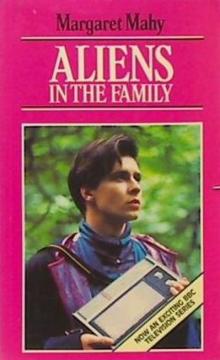 Aliens In The Family
Aliens In The Family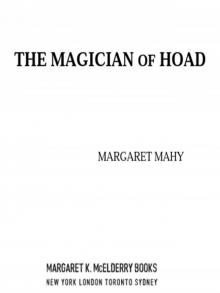 The Magician of Hoad
The Magician of Hoad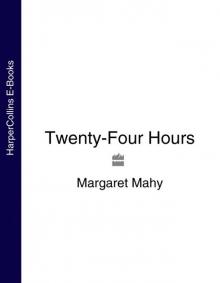 Twenty-Four Hours
Twenty-Four Hours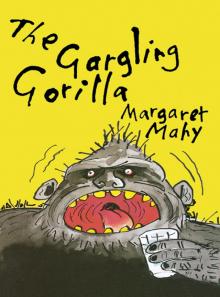 The Gargling Gorilla
The Gargling Gorilla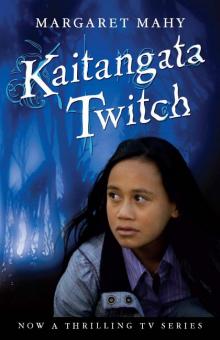 Kaitangata Twitch
Kaitangata Twitch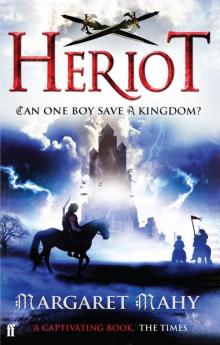 Heriot
Heriot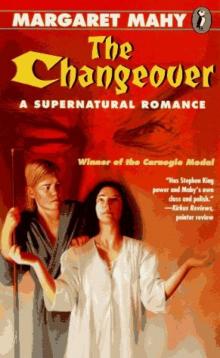 The Changeover
The Changeover